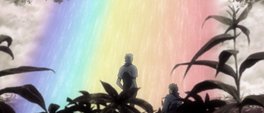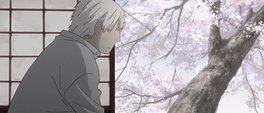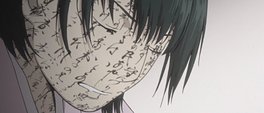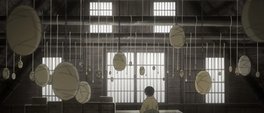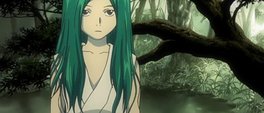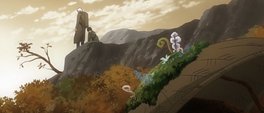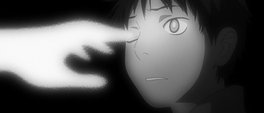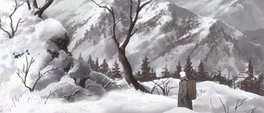Mushishi
Like the creatures themselves, Mushishi came more or less out of nowhere. A critically acclaimed manga by Yuki Urushibara mostly unheard of outside of Japan, and Studio Artland for which this would be one of their first fully produced series outside of some relatively obscure OVAs. For it to be so unspeakably brilliant is at odds with common wisdom; story and sound fuse together to create an astonishingly beautiful vision of Japan. Blossoming with wonder, it is a world that is delightful to be lost within: enraptured by the craftsmanship applied to the smallest detail and ensconced within the gentle auditory landscapes.
Comprising twenty six mostly episodic stories, the series follows Ginko: a silver haired nomad and a self-proclaimed Mushishi. Picking up where physicians may fail, he concerns himself with mushi, a primal and fugacious life force that suffuses the world but is often only known through their effects on its inhabitants. Sometimes these can be as innocuous as a living painting within a kimono, other times causing afflictions such as memory or hearing loss, but sporadically, they can affect entire communities whether inadvertently or through the misguided auspices of humans themselves. Regardless, Ginko travels listlessly from case to case, sometimes stumbling across one and other times cajoled by letters which travel through the mysterious mushi roads.
From the melancholy drawls of the opening track by Ally Kerr, it is boundlessly clear that the boisterous tumult that often characterises anime is wholly absent here, replaced by abstract pictures of sunlight through trees and a woman's voice foretelling the upcoming story. Colours are muted but naturalistic, hair colour rarely deviates from native blacks and browns with instead a keen eye for flesh tones and seasonal variations in clothing and scenery. Nature is everywhere, whether a tattered fishing village by the sea or a village tucked away in the nape of a mountain; hues and tones reflect this with marvellous acuity, imbuing an earthy and grounded aesthetic to the native environment. Juxtaposing this is Ginko, clad in modern clothing and with silver hair and jade eyes he stands out no matter the situation, though he can be considered normal in comparison with the mushi: translucent bodies and sweeping curves are their usual forms but this can vary from a leviathan of the sea to quicksilver sludge. Their proximity to the root of all things gifts them with a formless ephemerality that is initially alien but always imaginative.
Separating the Mushi from common explanations such as spirits or Mother Nature is one the wisest choices made by the series, allowing them to operate within their own mythos rather than giving them an overarching purpose - they simply exist, nothing more. Ginko's understanding of this and his methodology for interacting with them forms the core tenant of his outlook and lets him step outside the mushi-buster paradigm that he could otherwise easily fall into. As each episode covers a different set of characters and circumstances, one would expect repetition or at least a weakness or lack of empathy with the principle players. This is far from the case and every story builds a rapid and strong rapport with the characters, allowing the audience to effortlessly slip inside their lives and how they have been afflicted by the mushi. It is staggeringly brilliant writing: each plot is a self contained vignette of humanity with all its beauty and ugliness, bereft of prejudice and at the centre is Ginko who brushes against this diverse group with his astute, sometimes playful, always laid-back attitude.
Mushishi is at its best though when it explores the titular mushishi themselves. Far from being the only one of his kind, a unique support structure upholds the itinerant lifestyle of a mushishi, whether it is the logistical problem of getting letters to a person with no fixed address, to the way mushi research is stored and organised. These stories are rare within the series, numbering less than five in total, but represent the most potent and vivid stories in a collection of already stellar quality. These insights into the world itself are poignant but frequently tragic and range from the broken bond between twins to the actions of a predecessor crippling their descendants. Even rarer still are the dips into Ginko's past, how he came to lose his eye and the pigment in his hair and how someone who preternaturally attracts mushi survived into adulthood; they are fascinating for their scarcity and judiciously used, leaving him ample mystery but sating the desire to learn more about him.
Despite the possibility, none of the stories are morals or cautionary tales: they preach not of the wickedness of mankind against nature or the hubris of the intelligent and only tell a story without judgement. Ginko is as flawed as any of the other protagonists, often making mistakes or breaking supposedly cardinal rules - his sometimes cheeky sense of humour is the source of much of the lightheartedness the series has to offer. His modus operandi however is the puzzle; his drive for knowledge second only to his desire to aid people, whether it is looking over the lore of mushishis past or steadily deducing the best possible course of action, his fervour for understanding is what moves him forward, sometimes to the exception of personal relationships by those that would rather him settle. What the stories do achieve however is an acute sense of time, whether it is the months between a follow up or simply hearing the outcome of one of his cases, coupled with the changing seasons the sense of progression is palpable. Odd then that almost each story is, in its purest form, timeless; despite the kimonos and the rural setting, most stories are human in origin and the mushi are simply a catalyst - the loss of a child, the desire for the wellbeing of a community, the sacrifice of one for many - these are the heart and soul of the series, not the mushi themselves.
In the decade past, there has not been a series quite like Mushishi. It owes much to its source material, but while there are better animated shows, there is not one with such an exquisite soundscape. Gentle rhythms and quickened beats, it never overpowers and always enhances, coaxing one into the sublime sensorial reverie the series deftly creates. The painterly backgrounds are evocative and unique to each story, just as the ending tune is. Without a doubt Mushishi is one of the premier series of past ten years and will be a considered a masterpiece of the highest form long afterwards. Poignant, emotive and understated, to have experienced it is to have sampled heaven.
Vitals
First aired: 23 October 2005
Finished airing: 19 June 2006
Episodes: 26
Availability: DVD — Amazon.com, Amazon.co.uk, United Publications (UK)
References: MyAnimeList, Wikipedia, AniDB, Anime News Network
